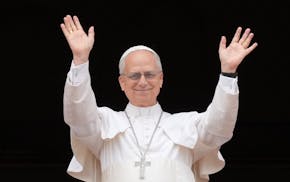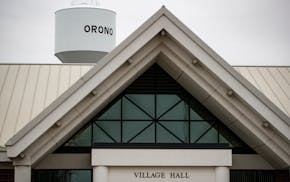A ballot measure this fall is slated to ask St. Paul voters whether city elections should be moved to align with presidential races.
The push for the change is being led by six St. Paul residents, who say even-year elections draw a higher turnout. The group submitted 5,505 verified petition signatures to Ramsey County election officials last month, enough to place the question on the ballot in November.
"We want to move our city elections to presidential years because that's when most people actually vote," said Peter Butler, a leader of the petition effort.
St. Paul's municipal elections, which have been held in odd-numbered years since 1983, historically have seen much lower turnout than even-numbered years.
More than 152,000 St. Paul voters cast ballots in 2020, boosting the city's turnout rate to about 85%. In last fall's municipal elections, only a third of registered voters cast ballots with about 48,000 voters weighing in on a citywide sales tax increase.
An attempt to pose a similar question to voters in 2017 failed after county election officials determined petitioners had not collected enough valid signatures. Butler challenged the elections office in court but lost.
This year, he and a handful of others quietly resumed their endeavors, reaching out to voters by knocking on doors and setting up tables at community events and businesses.
"Most people thought it was a great, common sense idea," said Butler, a former city budget staffer who ran for City Council last fall.
He added that he does not plan to campaign for the proposal once it's on the ballot.
The proposal already has drawn two high-profile opponents. In interviews Friday, St. Paul Mayor Melvin Carter and City Council President Mitra Jalali said they think that, while the measure is well-intended, it would do more harm than good.
"I think our municipal issues deserve a distinct conversation," Carter said. "And with all of the energy and attention that's focused on the national election this year, I think it would be really tough to have a substantive conversation about potholes or a substantive conversation about neighborhood crime."
If the measure is approved by voters, a transition would take place in 2028. St. Paul's seven council members, who were elected to four-year terms last fall, would serve an extra year. The mayor elected in November 2025 would serve a three-year term.
Carter, who said he plans to seek re-election, voiced concerns about the prospect of aligning the mayoral and council election cycles, saying it may be a disincentive for council members considering a run for mayor and give voters fewer chances to weigh in on what's going on at City Hall.
"We've seen, for example, how much has changed in the last four years — from COVID to the murder of George Floyd to inflation to everything else," he said.
Jalali said she has huge concerns about how such a change could affect the administration of elections. For instance, she said, St. Paul uses ranked-choice voting, and it's not clear how that could be translated to ballots that include presidential races.
"As I've learned more about what this would entail, I'm actually very concerned that it would be functionally impossible," Jalali said.
The council must approve the ballot measure language for it to move forward, a process that's typically more of a formality. Jalali noted that the council has tweaked the wording of past measures and said she's exploring all her options, including legal ones.
State statute requires notice of a ballot question for this November's election to be provided to the county auditor by Aug. 13.

Trump reportedly is set to accept a jet from Qatar's ruling family for possible use as Air Force One

Pope Leo XIV calls for peace in Ukraine and Gaza in symbolically rich blessing on Mother's Day

Arson caused fire that engulfed WWII buildings in Arden Hills, fire department says
Body of canoer found in Boundary Waters

